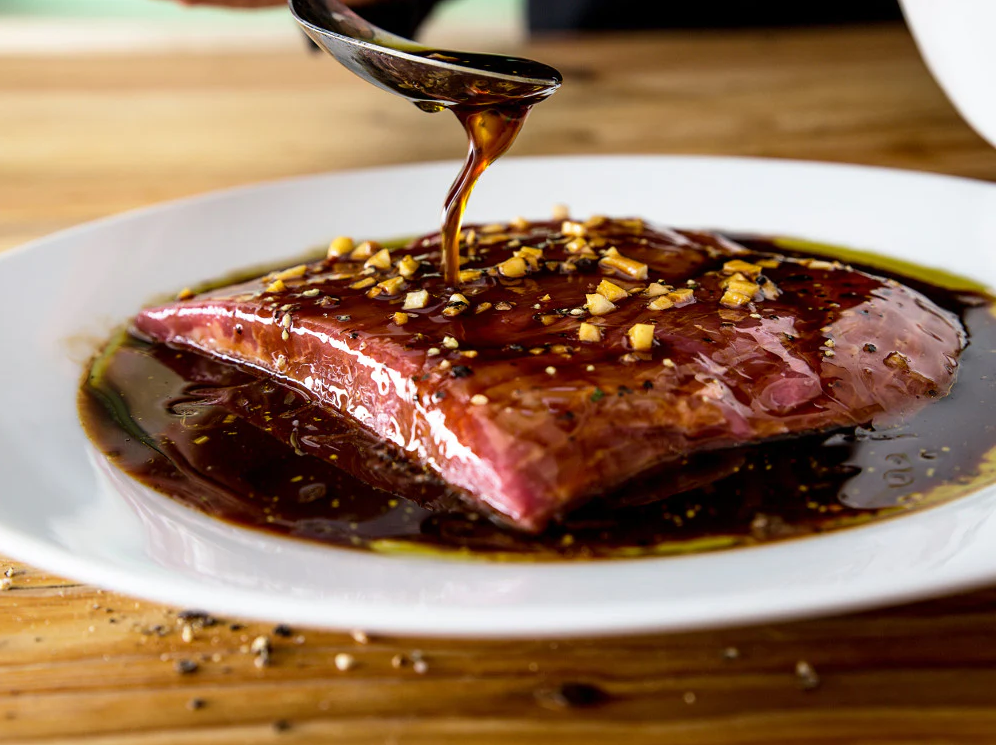
The importance of marinating meats before cooking
A marinade is a mixture of liquids, spices and aromatic herbs used to flavor and tenderize meat before cooking. In this process, the meat or fish cuts are soaked in the marinade for some time before being cooked.
Marinating is an ancient technique used to preserve meat for a longer period of time, but nowadays, it is mainly used to improve its flavor and texture.
How does the marinating affect the texture and flavor of meat?
Marinating has a number of positive effects on the texture and flavor of meat, including:
EFFECT ON TEXTURE
Marinating helps to break down the tough fibers of the meat, making it more tender and juicy. In addition, it helps to hydrate the meat, preventing it from drying out during cooking.
EFFECT ON TASTE
Marinating gives the meat an intense flavor and aroma, and also helps enhance the natural flavor of the meat. Although marinades cannot penetrate deep into the interior of the meat, their action on the outer surface of the meat is enough to flavor the meat and enhance its flavor.
TYPES OF MARINADES
Almost all marinades start with a fatty substance as a base, such as olive oil. After that, marinades can be divided into three main categories:
- Savory marinades: These marinades contain salt, which helps absorb the aromatics and hydrate the meat. Salt partially breaks down the proteins in meat (mainly myosin, which is responsible for muscle contraction) so that these proteins contract less when cooked. When this happens, the meat retains more liquid, so it is juicier and tenderer. Savory marinades are the most common ones
- Acidic marinades: These marinades contain vinegar, wine, lemon juice, or another acidic ingredient, which helps break down the tough meat fibers. Acidic marinades are ideal for tough meats such as beef and mutton.
- Enzyme marinades: Certain enzymes, found in some fruits such as pineapple, papaya, kiwi and fig, help break down meat proteins. Enzyme marinades are ideal for marinating chicken and pork, but can be used just as well for red meats.
Marinades can also be categorized based on their ingredients. Some popular marinade recipes include as a key ingredient:
- Yogurt: Yogurt is an excellent base for marinades, as it is rich in protein and moisture. Yogurt marinades are ideal for white meats such as chicken and fish.
- Spicy: Spice ingredients, such as black pepper and chili peppers, add a spicy flavor to marinades. These marinades are ideal for all types of meats.
- Mustard: Mustard adds a spicy flavor and helps break down tough meat fibers. Mustard marinades are ideal for tough meats such as beef, goat and mutton.
Marinating times depending on the type of meat
Different types of meat have different marinating needs both in terms of ingredients and time. White meats, such as chicken and fish, are tenderer and require less marinating time. Red meats, such as beef, pork and lamb are tougher, and need more marinating time.
Generally, marinating for at least 30 minutes will improve the flavor and texture of the meat. For best results, the meat should be marinated for at least 2 hours, but the marinating span depending on the kind of meat, could take up to 24 hours. Generally, higher in collagen and elastin cuts of meats need more marinating time to become juicy and tender when grilled.
POINTS TO KEEP IN MIND WHEN MARINATING
The axiom “the more, the better” does not apply to marinating. For example, leaving the meat in an acidic marinade for a long time can toughen the meat and have the opposite of the intended effect.
We must also be careful with the amount of acidic agents in a marinade, as too much acidity can “cook” our meat.
Given that the marinade penetrates just a few millimeters below the surface of the meat, it follows that the smaller the pieces of meat we marinate, the more flavor we will get.
In addition, it is good to do the marinating in the refrigerator, especially in the months with high temperatures.



